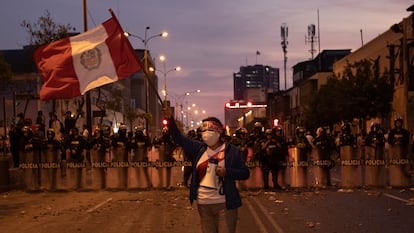Peru’s government extends state of emergency to counter growing protests
President Dina Boluarte – who was sworn in last week – has adopted the measure for the next 30 days, after at least seven people were killed in clashes between police and rioters

On Wednesday, December 14, the Peruvian government extended a state of emergency across the entire country. The measure was announced due to the rising frequency and intensity of protests, which have left at least seven dead.
The protestors – most of them concentrated in the Andean south of Peru – are calling for the dissolution of Congress and the convocation of new elections, six days after former president Pedro Castillo launched an unsuccessful self-coup. Castillo ended up impeached and in custody, while his vice president – Dina Boluarte – assumed office, becoming the first female president in Peru’s history.
While opinion polls indicate that the most Peruvians supported the impeachment and arrest of Castillo, Boluarte has failed to quell public discontent. Clashes between protestors and authorities are continuing, with various attacks on public and private property by pro-Castillo demonstrators.

Defense Minister Alberto Otárola announced that the state of emergency will be expanded and extended for the next 30 days: “Due to the vandalism and violence, the seizure of highways and roads – destabilizing acts that are being addressed by the National Police and the Armed Forces – the situation demands a forceful response from the government.”
Under the state of emergency, the military will take charge of several elements of public safety. Certain basic rights will be temporarily suspended – such as freedom of movement and assembly. The government will also have the right to decree curfews, should the situation escalate further.
The protests began on December 8, one day after Pedro Castillo unsuccessfully attempted to dissolve Congress. The courts, Armed Forces, National Police and the general public refused to go along with his proposal to rule by decree and reorganize the judiciary.
Boluarte – who legally has the right to finish the remaining three-and-a-half years of Castillo’s term – tried to calm the initial sparks of violence by presenting a proposal to move elections up from April 2026 to April 2024. This proved to be insufficient.
Across the heavily Indigenous and more impoverished south of Peru – Castillo’s stronghold – protestors blocked highways and airport runways. Acts of vandalism and looting followed. The demonstrators – many of them affiliated with the teachers’ unions – are demanding that President Boluarte immediately call new elections. The message that “everyone should go” has resonated with much of the public, even among those who opposed Castillo. Peruvians are weary: in just the last four years, there have been six different presidents.
Castillo is currently under preliminary detention for the charge of rebellion. He was arrested by his own security forces while en route to seek asylum in the Embassy of Mexico in Lima after he realized that his coup attempt had failed.
Several fellow left-wing presidents in the region have since come to his aid. Colombia’s Gustavo Petro has been being especially active: “The crisis in Peru, the arrest – without a judge or defense – of a popularly-elected president has seriously questioned the role of the American Convention [on Human Rights] in the Latin American legal system,” the Colombian president wrote on Twitter.
Several days ago, Mexican President López Obrador, Argentine President Alberto Fernández and Bolivian President Luis Arce met with Petro to release a letter in defense of Castillo. They called on “those who make up the institutions to refrain from reversing the popular will expressed in free elections [in 2021].” This was meant to delegitimize Boluarte’s authority.
Castillo has embraced this discourse from his jail cell. He still considers himself to be the legitimate president of Peru. Yet, after burning his bridges with his country’s democratic institutions, he is now just another citizen. The National Prosecutor’s office is building a case that could sentence Castillo to up to 50 years in prison. In addition to the charge of rebellion, he, his family and his advisors have been facing dozens of corruption investigations since his term began 16 months ago. Now that he no longer has executive immunity, charges can be brought forward.
Since his arrest, the former union organizer and schoolteacher has been writing a letter each day by hand and posting it on his Twitter account:
“I was elected by the forgotten men and women of Peru… by the dispossessed who have been neglected for more than 200 years. Since I took office, [the Congress] has rejected the will of the people. They even prevented me from travelling [Peruvian presidents require congressional approval to go abroad] to visit brother countries like Colombia and Mexico,” he wrote on Wednesday.
While it is true that Castillo was consistently opposed by the Congress of Peru – which is dominated by center-left, centrist and right-wing parties who oppose his Marxist allies – he also governed in an improvised, chaotic manner. At least 70 cabinet ministers – many with no expertise in their portfolios – were appointed and resigned during his short tenure. Top presidential aides were convicted for corruption, as was the president’s sister-in-law. And, despite the recent words of support from Petro and López Obrador, for the past year-and-a-half, left-wing presidents have been reluctant to include Castillo – who won his election by less than 0.3% – in the new Latin American progressive alliance.
The nation is now adrift. Despite appointing a competent cabinet of technocrats, Boluarte has not managed to stabilize the situation. The state of emergency is one of her last chances to restore calm, but she will need to ensure that the security crackdown does not get out of hand. If it does, her days in office will likely be numbered. As modern history shows us, the presidency of Peru is an unforgiving job.
Sign up for our weekly newsletter to get more English-language news coverage from EL PAÍS USA Edition
Tu suscripción se está usando en otro dispositivo
¿Quieres añadir otro usuario a tu suscripción?
Si continúas leyendo en este dispositivo, no se podrá leer en el otro.
FlechaTu suscripción se está usando en otro dispositivo y solo puedes acceder a EL PAÍS desde un dispositivo a la vez.
Si quieres compartir tu cuenta, cambia tu suscripción a la modalidad Premium, así podrás añadir otro usuario. Cada uno accederá con su propia cuenta de email, lo que os permitirá personalizar vuestra experiencia en EL PAÍS.
¿Tienes una suscripción de empresa? Accede aquí para contratar más cuentas.
En el caso de no saber quién está usando tu cuenta, te recomendamos cambiar tu contraseña aquí.
Si decides continuar compartiendo tu cuenta, este mensaje se mostrará en tu dispositivo y en el de la otra persona que está usando tu cuenta de forma indefinida, afectando a tu experiencia de lectura. Puedes consultar aquí los términos y condiciones de la suscripción digital.









































